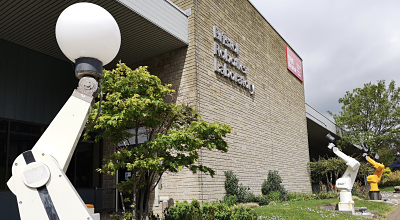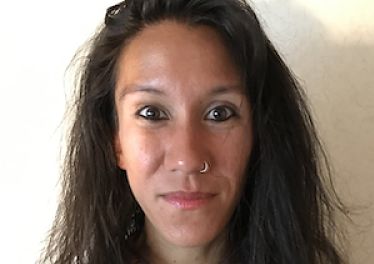Hemma Philamore – EDI champion
Former Bristol PhD student Dr Hemma Philamore recently returned as a lecturer in Engineering Mathematics. She quickly took on the role of academic Equity, Diversity, and Inclusion Adviser to help embed an inclusive culture across the school.
Hemma grew up and went to university in London and first came to Bristol for her Robotics PhD in 2012. She spent three years in Japan as a postdoc and then lectured in Robotics. She shares her thoughts and experiences so far.
What made you want to come back to Bristol?

I really benefitted from my PhD being co-supervised between UWE and Bristol Uni. When I finished, I had this feeling that I needed to go away or I’d end up staying in Bristol forever. When I was offered a job in Japan I thought ‘this sounds like a great adventure’.
How is the job going?

Starting a new job that involves working with people and almost immediately going into lockdown was weird and difficult. I only just got to say hello and then I was working from home. It’s shown me how valuable our work community is to my research and my happiness. Taking on additional responsibilities within my current role is really positive and has help me connect with people.
What does your Equity, Diversity, and Inclusion role in SCEEM involve?
As EDI Advisor for SCEEM, I’m the communication link between lots of separate groups. EDI action groups target different aspects around the school: the STEM BAME staff network, the Women and Non-binary staff network and our student EDI reps. I liaise with these groups as well as the SMT (Senior Management Team) and the Faculty EDI committee to bring together viewpoints from across our community – things that need changing, things we’re doing well or things we might want to communicate differently.
How do you identify and is this important to you?
I identify as female and I’m mixed-race. I had not really realised the professional importance of my identity until joining SCEEM. As a student, I wasn’t as aware of the lack of representation of minority groups in senior roles because the student population and junior roles are much more diverse. While in Japan, I expected to be in the minority as a foreigner but now I’m in an environment where there are clearly fewer people like me than there should be, identity has become quite important in my professional life. I have suddenly realised that there might be identity-related barriers to me progressing in my career but I hope my being here shows other people that they can be too.
Can you tell us a bit more about those barriers?
I joined the University and started in my EDI adviser role in the immediate aftermath of the Black Lives Matter protests. It was an alarming but also positive time because people were being very vocal about how life experiences affected them, particularly around issues of race. Some of the problems that people were facing within the University became really visible. So, it was a good place to start as I had this scary awakening to problems people had faced and therefore that I might face in the future. One push back was a male colleague saying I must have had more help than them to do something, implying I couldn’t possibly have done it on my own. It can be a difficult balance to provide access to people without leaving them open to that sort of attitude. It is something that happens, and it’s really undermining when it does. EDI-related actions can widen access. The intention is positive but if they’re not effective, they can be tokenistic and dilute those actions that do have meaningful outcomes.
What do you think institutions such as ours can do to reduce these barriers?
Where things that haven’t quite worked in the past, we are looking at why that might be. One example is the interview panel. We realised that some people were being overburdened in the effort to ensure panels had diverse representation. Feedback from the BAME community and the women and non-binary network highlighted a need for more representation but Heads of Department were asking how they might choose people for panels without overburdening them. A solution has been to involve more junior colleagues on panels, which improves diversity and offers valuable experience too. I have learnt so much about how my own role is viewed by more senior members of the organisation from seeing an interview from the other side. I think we can use this approach in a lot of processes.
How can individuals help people who face the barriers you have described in a useful way?
It’s good to expand your own awareness of how someone’s situation might differ from yours. For example, students that you supervise might experience things differently, express themselves differently or express a particular need differently. It can be difficult but information is available. I’m hoping we can help with an online seminar series that the BAME STEM network is planning. We’ll be looking at specific topics; how mental health issues manifest differently in diverse groups of people, how people experience data bias, etc.. Appreciating different perspectives is important. Colleagues will often say things without meaning any harm, without realising you might be shocked or offended. We are a diverse community and we have a lot to learn from each other. When I called someone out, they responded positively and said ‘ok can we talk about that?’. So something individuals can do is be open to constructive criticism.
What else have you seen happen?
There’s an on-going university-wide audit to ensure students ‘known as’ names are used in university systems, to protect trans students from being involuntarily outed for example. We’re also providing support to help lecturers integrate EDI into STEM teaching. We are listening to students more – departmental student EDI reps are now part of our EDI governance structure which should give them more of a voice in the work we’re doing. We’ve trained these reps in how to signpost different EDI-related services within the University and we’re planning to have staff reps in the near future too.
Why are staff networks useful?
By attending the STEM BAME staff group, I get to hear about lived experiences directly. People can be more open in those spaces, so you get a truer reflection of how someone feels than you would in a different context. There’s a sense of connectivity. As the network is for staff from both Science and Engineering faculties, it’s a much larger community with shared issues. Having a broader reach and gathering opinions from across the University means you have a wider culture of people working together on EDI.
What advice would you give to a young woman who is a considering similar career?
When I was studying, I didn’t feel that I had a lot of a barriers, mainly due to the diversity of the student population. So, my advice is to carry forwards all the positives you get from being a student in a diverse environment. Those positives can inform those in more senior roles.
You mentioned the “leaky pipeline” – where diversity decreases as seniority increases. Why do you think this is and what can we do about it?
Find out more
Engineering includes me
Faculty EDI website
Bristol Robotics Lab
School of Engineering Mathematics
Dr Hemma Philamore – Research Profile
There are obvious historical barriers. Some colleagues in senior roles say that as people make their way through, this will change organically over time. But there is a problem of critical mass. When people in senior roles are all so similar it acts as a cultural barrier. We could encourage a culture that’s less meritocratic, that appreciates people that have overcome difficulties to get where they are. At the moment, people with valuable characteristics that don’t fit the mould aren’t necessarily recognised because senior people making hiring and promotion decisions have had such different life experiences. For example, a colleague of mine flagged that for professor-level promotions, candidates from a different country quite often won’t meet the tick-box requirements. We need more flexibility so we don’t turn away good people.
This goes for other things too. Having applied for the exact same job at two different universities in two different countries, I found that the application process was completely different. We need to communicate this better to candidates and be less heavy-handed in how we reach them. Even advertising jobs on professional networks rather than in newspapers doesn’t necessarily attract a wide enough range of people for senior roles. We need to focus on culture. Every time I’ve gone for a job, someone that’s already there has said ‘have you seen this role coming up?’. They share their experience, and you decide based on that. Diversity among academic staff will change when the working culture changes and existing staff can truly recommend joining to potential new colleagues.
You mentioned you have a mentor, tell me a bit more about that?
When you join the University, you’re assigned a mentor who’s in a more senior role for a professional overview. You also get a buddy who is on a similar level to you but isn’t part of your research group. They are usually just a few years ahead. They are good at pre-empting things I may need help with such as proposing a new unit or going for a promotion. There’s a real drive now to pair people with mentors or buddies who have similar personal characteristics. It would have been a positive experience for me to talk to someone female or someone more senior but also from an underrepresented group. In embedding EDI in the curriculum, particularly the a STEM curriculum, we worked with Shail Patel from the Industrial Advisory Board. He’s offered a mentorship role as someone senior from a background similar to my own. Having mentors from outside the University could really enrich the experience.


